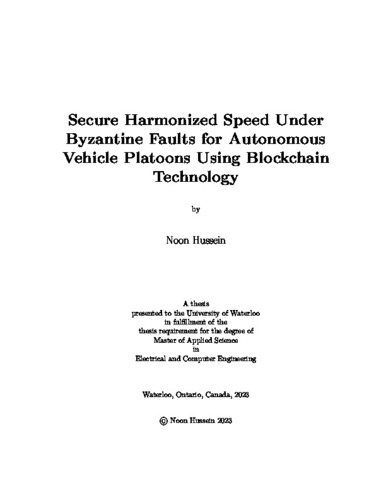| dc.description.abstract | Autonomous Vehicle (AV) platooning holds the promise of safer and more efficient road transportation. By coordinating the movements of a group of vehicles, platooning offers benefits such as reduced energy consumption, lower emissions, and improved traffic flow. However, the realization of these advantages hinges on the ability of platooning vehicles to reach a consensus and maintain secure, cooperative behavior.
Byzantine behavior [1,2], characterized by vehicles transmitting incorrect or conflicting information, threatens the integrity of platoon coordination. Vehicles within the platoon share vital data such as position, speed, and other relevant information to optimize their operation, ensuring safe and efficient driving. However, Byzantine behavior in AV platoons presents a critical challenge by disrupting coordinated operations. Consequently, the malicious transmission of conflicting information can lead to safety compromises, traffic disruptions, energy inefficiency, loss of trust, chain reactions of faults, and legal complexities [3,4].
In this light, this thesis delves into the challenges posed by Byzantine behavior within platoons and presents a robust solution using ConsenCar; a blockchain-based protocol for AV platoons which aims to address Byzantine faults in order to maintain reliable and secure platoon operations.
Recognizing the complex obstacles presented by Byzantine faults in these critical real-time systems, this research exploits the potential of blockchain technology to establish Byzantine Fault Tolerance (BFT) through Vehicle-to-Vehicle (V2V) communications over a Vehicular Ad hoc NETwork (VANET). The operational procedure of ConsenCar involves several stages, including proposal validation, decision-making, and eliminating faulty vehicles. In instances such as speed harmonization, the decentralized network framework enables vehicles to exchange messages to ultimately agree on a harmonized speed that
maximizes safety and efficiency. Notably, ConsenCar is designed to detect and isolate vehicles displaying Byzantine behavior, ensuring that their actions do not compromise the integrity of decision-making. Consequently, ConsenCar results in a robust assurance that all non-faulty vehicles converge on unanimous decisions.
By testing ConsenCar on the speed harmonization operation, simulation results indicate that under the presence of Byzantine behavior, the protocol successfully detects and eliminates faulty vehicles, provided that more than two-thirds of the vehicles are non-faulty. This allows non-faulty vehicles to achieve secure harmonized speed and maintain safe platoon operations. As such, the protocol generalizes to secure other platooning operations, including splitting and merging, intersection negotiation, lane-changing, and others. The implications of this research are significant for the future of AV platooning, as it establishes BFT to enhance the safety, efficiency, and reliability of AV transportation, therefore paving the way for improved security and cooperative road ecosystems. | en |

